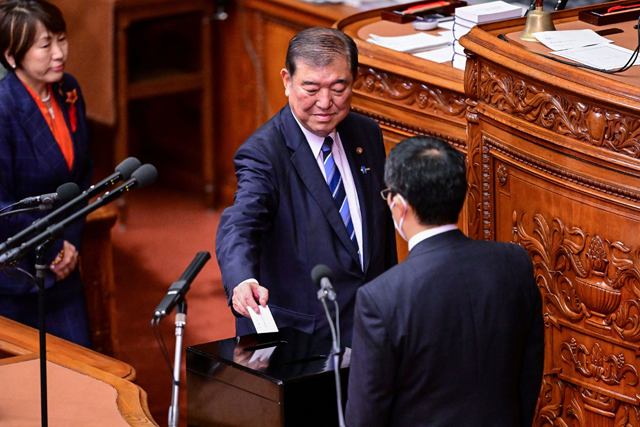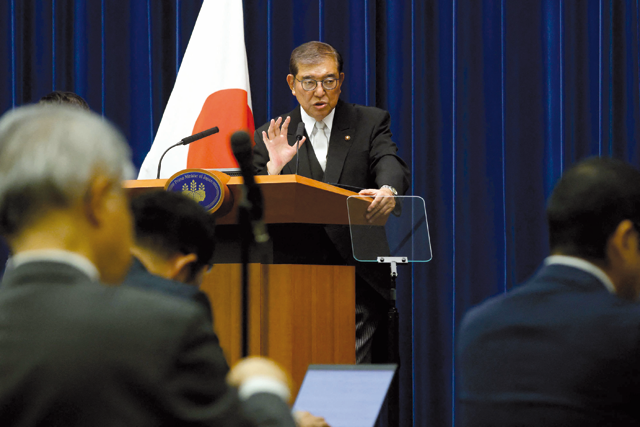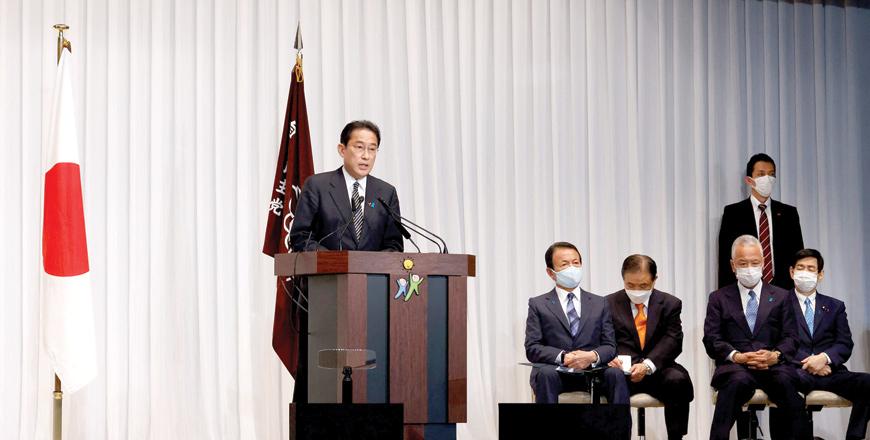You are here
Shigeru Ishiba: Japan's new PM on shaky ground
By AFP - Oct 24,2024 - Last updated at Oct 24,2024

This file photo taken on October 1 shows Shigeru Ishiba (centre), the then-new head of the ruling Liberal Democratic Party (LDP), casting his ballot as he attends an extraordinary session of the lower house of parliament to select a new prime minister in Tokyo (AFP photo)
TOKYO — Japanese Prime Minister Shigeru Ishiba likes crafting model ships but his short tenure could come unstuck if the gamble of calling snap elections goes as badly on Sunday as some polls suggest.
The self-confessed defence "geek" is a fan of trains, 1970s pop idols and making military models, including once of a Soviet aircraft carrier for a visiting Russian defence minister.
Last month the 67-year-old saw off eight other candidates to become head of the Liberal Democratic Party (LDP), which has governed Japan almost uninterrupted for seven decades.
He took office on October 1, replacing Fumio Kishida, who suffered from discontent over rising prices, a slush fund scandal and LDP ties to a Christian movement in the wake of the 2022 assassination of ex-premier Shinzo Abe.
Although relatively popular with the public -- at least before becoming PM -- Ishiba had four previous failed bids to lead the party including in 2012 against his arch-rival Abe.
Ishiba long alienated party heavyweights with his "outspoken criticism of LDP policies under Abe", said Yu Uchiyama, a politics professor at the University of Tokyo.
But he became "vocal about the need for the LDP to turn over a new leaf", which may have worked in his favour, Uchiyama told AFP.
'New Japan'
Despite hiccups, including over a doctored photo of the Cabinet, Ishiba got off to a good start and called snap elections after barely a week in office.
"This is an attempt to create a new Japan that will drastically change the nature of Japanese society. In order to boldly carry out this major change, we need the confidence of the people," he declared.
He pledged to revitalise depressed rural regions and to address the "quiet emergency" of Japan's falling population with measures to support families like flexible working hours.
This decade, he said he wants to hike the average national minimum wage by nearly 43 per cent to 1,500 yen ($9.80) per hour, although experts worry this will hurt small firms.
In a reference to China, Ishiba said that "today's Ukraine could be tomorrow's East Asia", with the regional environment "the most severe since the end of World War II".
He has also backed the creation of a regional military alliance along the lines of NATO to counter China, although he has since cautioned it would "not happen overnight".
But Ishiba's support before becoming premier for the Bank of Japan's exit from its ultra-loose policies sent the yen surging and stocks tumbling after he won the LDP leadership.
He steadied markets by stating the time was not right for more interest rate hikes.
Rowing back
Early polls gave Ishiba's Cabinet approval ratings of 45-50 per cent, compared with 20-30 per cent for the hapless Kishida administration's final month.
But Ishiba's ratings have since fallen, not helped by him rowing back his position on issues including allowing married couples to take separate surnames.
He also walked back on a commitment to increase the tax rate on capital gains, saying he was "not currently considering a specific tax increase".
The father-of-two also missed a chance to appear more modern by appointing only two women to his cabinet, down from five under Kishida.
Popularity among voters is a different beast to the LDP leadership contest, where Ishiba "appeared popular because he occupied a unique position, standing in opposition to PM Abe and his successors within the party", said Yosuke Sunahara, professor of public administration at Kobe University.
"Now the focus has shifted from an internal party race to competition between parties. Unlike Abe, who was known for his hawkish stance and reform-driven agenda, it has become harder for Ishiba to distinguish himself," Sunahara told AFP.
A Kyodo News survey last weekend put the approval rating for Ishiba's cabinet at 41.4 per cent, down from 42 per cent a week earlier.
Other polls warn the LDP could fail to win a majority on its own for the first time since 2009.
Some paint an even sorrier picture, suggesting that even seats from the LDP's junior coalition party will not be enough for Ishiba to form a government without other partners.
"Regardless of what the election results are, Ishiba's longevity as prime minister is in question," said Rintaro Nishimura at think-tank The Asia Group.
"There is a group of people [in the LDP] that could form a critical mass... and try and usher in a change. Not a change in government, but a change in leadership within the LDP," Nishimura said.
Related Articles
TOKYO — Japanese Prime Minister Shigeru Ishiba kept his job in a parliamentary vote on Monday, despite having recently led the ruling coalit
TOKYO — Japan’s ruling party said Wednesday it will vote September 14 on a replacement for outgoing prime minister Shinzo Abe, who is steppi
TOKYO — Japan's Prime Minister Fumio Kishida declared victory on Monday after his ruling coalition won a strong majority in national electio


















